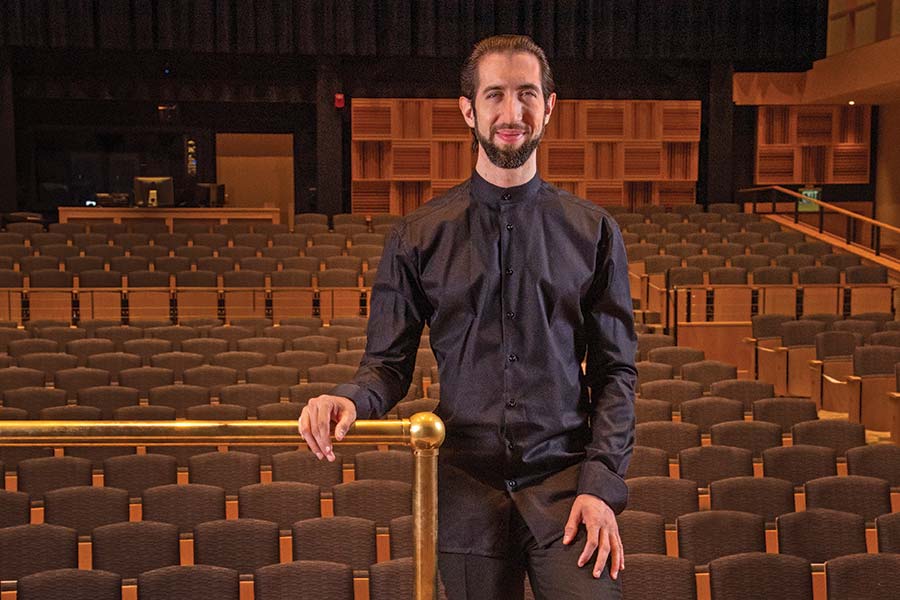THEIR LIFE'S WORK
Connecting People Through Music
Like an orchestra, Evan Meccarello’s roles are greater than the sum of their parts.
by Sofia Tokar

To Evan Meccarello ’12, his career as a freelance professional musician resembles an orchestra. That is, both are greater than the sum of their parts.
To be sure, Meccarello plays many parts. Among them is music director — most recently of the Binghamton Community Orchestra — and conductor of various professional, collegiate, youth, and community ensembles in Upstate New York and around the Northeastern United States, including at Nazareth College. He’s also known as a radio host, performer, educator, and classical music advocate.
“It’s important for me to create music and to connect with others through music,” he says. “When people play in or listen to orchestras, I think it’s because they want to be part of something bigger than themselves. With their size, complexity, and beauty, orchestras are one of the ultimate expressions of that desire.”
Meccarello’s desire to be part of something greater than himself took the form of conducting. One of his first conducting experiences took place during high school in the youth orchestra program at the Hochstein School of Music, when he led the orchestra in performing a piece by Nancy Strelau, associate professor of professional practice at Nazareth’s School of Music. He cites Strelau as “an incredible influence who was formative for my view of when classical music is made and who writes it.”
Strelau’s influence continued when Meccarello enrolled at Nazareth as a violin performance major. While studying at the College, he apprenticed with Strelau to develop his conducting acumen. “By the end of high school, I knew that I wanted to play in a professional orchestra,” he recalls. “But what I learned at Nazareth was that I really wanted to conduct the orchestra.”
Now, as a music director based in Rochester, New York, Meccarello chooses the music for his orchestras’ seasons. “Ninety percent of the work happens before the first rehearsal,” he says. In addition to administrative responsibilities, this work includes selecting, studying, and mastering the arrangements and compositions to be performed.
That process is both immersive and solitary. But, Meccarello says, “then you have to stand in front of large groups of people — musicians and audiences — and genuinely connect with them. It’s two extreme social modes in one professional role.”
He believes in classical music’s capacity to bridge other extremes, such as the past and the present. “Classical music should not be about gatekeeping; it’s about taking a historical tradition and moving it forward,” he says. “What makes it great are the opportunities to bring together new and different instruments, genres, and people.”
Of course, bringing together people has been a challenge amid the coronavirus pandemic. Undeterred, Meccarello has explored ways for his students and colleagues to practice and perform using YouTube, Zoom, and other online tools. (“With its partial lag and asynchronicity, Zoom is like its own instrument, one you have to learn to play and write for,” he says.) He’s also excited by the prospect of partnering with schools and nursing homes to give more people access to orchestral music.
Meanwhile, as conductor for the Irondequoit Community Orchestra near Rochester, New York, Meccarello arranged for outdoor rehearsals during the summer months — complete with masks and physical distancing. Despite the occasional challenge, such as the sun setting in players’ eyes or trying to communicate nonverbally with a mask-covered face, he says, “the experience has underscored the value of being together through music.”
Sofia Tokar is a writer in Rochester, N.Y.